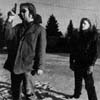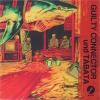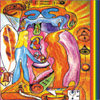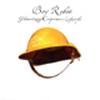Lexicon Devil
With the homemade aesthetic as marketable as ever, and luminaries of the cassette noise underground priming for the next
JANEmagazine feature, it's a surprise the 80's industro-punker annals havenot yet been thoroughly stormed for reissue. Digitizing the past can befun and will sometimes produce a posthumous legend, but all too oftenthe process does nothing more than make undeserving, even undesiringheroes of the old, and uninspired imitators of the young. At presentit's hard for me to listen to a Wolf Eyes record without hearing aco-worker rattle on about the glory days of SPK, and my enjoying SPKgets complicated by a guard against someone else's glamorization. Mysalvation comes with reissues that can show me "new" things, like alost inspiration or the missing link in the evolution of a style, butwith an added suspension of recognition. In other words, the best musicmust allow me to lose myself, must first lead me astray, or wipe theslate clean, before revealing its true character. Luckily, this BoyDirt Car reissue, containing the group's best full length and theirside to a split with fellow Milwaukians F/i, is forged of such raresteel.
Wintershows me a time when bands playing indulgent static dirges or whistlingthrough vocal effects formed just another dark corner of the localhardcore scene, a time when anyone could plug in a broken keyboard,start mumbling about the highway at night, and become genius for a day.Formed from a couple members of Die Kreuzen and some like-minded,Branca-inspired youths, Boy Dirt Car was fertile ground for a marriageof punk and industrial philosophies, coming to climax in '86-'87 withthese two releases. The unfortunately-named band took its blueprintfrom the slowed-down doom punk of bands like Flipper, shattering it toinclude the open spaces and electrified edges of early Neubauten. Oneof the most striking qualities of the music is how little the grouprelies on anything more than guitars to construct their elaboratetapestries of noise. Songs like "Forms Forced Surrender" and the brutaltitle track show evidence of either several moments of collectivebrilliance, or several dozen painstaking overdubs. Elsewhere, tracksrange from the Null-ian meltdown of "Invisible Man" to the opening"Smear," a delicate wound of crisp delay, amp buzz, and metallicpercussion. While the homemade vibe exists throughout, it neverencourages a preoccupation with process, instead reinforcing a sense ofyouthful exuberance in the music. Listening to
Winter, thisexuberance and a kind of punk-ist abandon are hard to ignore, makingthe few moments of lyrical cheese, bad poetry, and guitar wank easy toswallow. As with any great punk band, clich? and indulgences soonbecome part of Boy Dirt Car's rather addictive appeal, and ultimatelythese humorous missteps help to form more of an accessible foundationfor the group's frequent excursions into righteous, blistering noise.
samples:
 Who knew that getting rid of Sachiko M's piercing sine waves and addinga percussionist to the group could actually result in an album that's less catchy than the last one? That's not to say that Peek-Ara-Boois bad, because it definitely isn't, but beyond the first track (thinkgarage rock guitar line played on koto), there isn't a lot on the discthat will provoke huge idiot grins. What is found is a quiet collectionof lullabies, twangy folk songs, clattering percussion, and Haco'spiercing sine waves, which are really only distinguishable from SachikoM's in that they're generally busier. For such an odd mix ofingredients, the recipe turns out well more often than not: some willthink the sounds occupy a space a bit too close to Enya/LoreenaMcKennitt/Kim Robertson territory, but then it shifts out of dreamlandand into loud-tuneless-improv gear for a while, soiling the pants ofthe Quinlan Road crowd in the process. It's not a particularly cohesivealbum by any means (writing credits are all over the map, with sometracks being credited to the group as a whole and others to individualmembers, and it shows... er... sounds... whatever...), but as aninteresting grab-bag of sounds, it was worth my fourteen bucks.
Who knew that getting rid of Sachiko M's piercing sine waves and addinga percussionist to the group could actually result in an album that's less catchy than the last one? That's not to say that Peek-Ara-Boois bad, because it definitely isn't, but beyond the first track (thinkgarage rock guitar line played on koto), there isn't a lot on the discthat will provoke huge idiot grins. What is found is a quiet collectionof lullabies, twangy folk songs, clattering percussion, and Haco'spiercing sine waves, which are really only distinguishable from SachikoM's in that they're generally busier. For such an odd mix ofingredients, the recipe turns out well more often than not: some willthink the sounds occupy a space a bit too close to Enya/LoreenaMcKennitt/Kim Robertson territory, but then it shifts out of dreamlandand into loud-tuneless-improv gear for a while, soiling the pants ofthe Quinlan Road crowd in the process. It's not a particularly cohesivealbum by any means (writing credits are all over the map, with sometracks being credited to the group as a whole and others to individualmembers, and it shows... er... sounds... whatever...), but as aninteresting grab-bag of sounds, it was worth my fourteen bucks. 


 A friend of mine used to claim that a few CDs in his collection"contain every frequency." Whether this somewhat meaningless statementwas intended as an endorsement of quality was never clear; perhaps theywere just useful for testing audio equipment. This CD certainly fitsthat category, with the duo of Japanese musicians playing over 20instruments, exploring improvised, outer-space textures and abstractmelodies blanketed under shimmering waves of power electronics. Theoccasionally harsh assault isn't surprising given Guilty Connector'scollaborations with the likes of MSBR, but in the context of this duo,the noise serves as a backdrop and counterpoint to Tabata's guitar andsynthesizer rather than the brutal focal point. Though their aestheticis similar to fellow psychedelic groups like Acid Mothers Temple, thisCD steers clear of the over-the-top rock freakout, instead exploringprimarily rhythmless, atmospheric pieces more rooted in freeimprovisation and noise. Tabata does throw in some backward guitarriffing on "Le Schiaue Esistono Ancora," amid the continuous clatter ofcymbals that grow progressively more distorted; it's a mysteriouslyemotive and vaguely Eastern sounding track. Another standout is "Tempusest quaedam pars aeternitatis," which begins with a heavily processedguitar sound that blends perfectly with the filtered electronic noiseas it is delayed and continues ringing. It's certainly not easylistening, but there's so much going on throughout this disc, bothabove and below the surface, that it's definitely interesting. Thepersonalities and styles of the two players fit well together makingthis an excellent recording.
A friend of mine used to claim that a few CDs in his collection"contain every frequency." Whether this somewhat meaningless statementwas intended as an endorsement of quality was never clear; perhaps theywere just useful for testing audio equipment. This CD certainly fitsthat category, with the duo of Japanese musicians playing over 20instruments, exploring improvised, outer-space textures and abstractmelodies blanketed under shimmering waves of power electronics. Theoccasionally harsh assault isn't surprising given Guilty Connector'scollaborations with the likes of MSBR, but in the context of this duo,the noise serves as a backdrop and counterpoint to Tabata's guitar andsynthesizer rather than the brutal focal point. Though their aestheticis similar to fellow psychedelic groups like Acid Mothers Temple, thisCD steers clear of the over-the-top rock freakout, instead exploringprimarily rhythmless, atmospheric pieces more rooted in freeimprovisation and noise. Tabata does throw in some backward guitarriffing on "Le Schiaue Esistono Ancora," amid the continuous clatter ofcymbals that grow progressively more distorted; it's a mysteriouslyemotive and vaguely Eastern sounding track. Another standout is "Tempusest quaedam pars aeternitatis," which begins with a heavily processedguitar sound that blends perfectly with the filtered electronic noiseas it is delayed and continues ringing. It's certainly not easylistening, but there's so much going on throughout this disc, bothabove and below the surface, that it's definitely interesting. Thepersonalities and styles of the two players fit well together makingthis an excellent recording.  Having heard a bit about this band in the positive, I was expectingsomething exciting and spaced-out. I certainly received the second halfof that deal with this disc, but whether or not it's exciting dependsentirely on tolerance for strange vocals. Pacalirte Sorban Cumanosfeatures a duo of guitarists that weave spiral nausea out of thin air,a fairly straightforward but pounding drummer, and the most annoyingsinger I think I've ever heard. Perhaps within a different context thelyrics and delivery would somehow fit and make for a mind-bending ride,but the chanting and headless meander of half-words simply don't workwith the tuneless and perpetual descent that the guitars create. Casein point: "7 Apoloca Baluba" is a childlike combo of simple chordstrumming, what could be a flute but is actually a very cleverly playedguitar, and plodding drums. The effect is enchanting as long as thosemoans and groans coming from the singer are ignored. They sound as ifthey don't belong or are inserted at a later time without the singereven listening to what was composed prior to his contribution. "TriloPampeho" would be a hellish delivery of tribal drumming and machinerydrone, but again the vocals (which sound as if they are trying toimitate a certain song from The Police) cut into the mix and end upmaking everything wash away in a feeling of confusion and foolery."Fincoll (que norar)" is the one place where the singer truly standsout and delivers a performance worth checking out. It sounds as thoughit may all be coming from a dilapidated church in the middle of adesert: very faint organ wanders away in the background while themumbling and passion-esque warble of the vocalists (invoking "AveMaria" here and there?) raise to the sky in a stream of smoke andsizzling ash. Some of the cosmic sounds pulled out of the guitars forthis record are truly amazing. It's certainly a unique release, butthose vocals need to fit into the mix: when they do, it soundsoutstanding, but otherwise it's a mess that's difficult to sit through.
Having heard a bit about this band in the positive, I was expectingsomething exciting and spaced-out. I certainly received the second halfof that deal with this disc, but whether or not it's exciting dependsentirely on tolerance for strange vocals. Pacalirte Sorban Cumanosfeatures a duo of guitarists that weave spiral nausea out of thin air,a fairly straightforward but pounding drummer, and the most annoyingsinger I think I've ever heard. Perhaps within a different context thelyrics and delivery would somehow fit and make for a mind-bending ride,but the chanting and headless meander of half-words simply don't workwith the tuneless and perpetual descent that the guitars create. Casein point: "7 Apoloca Baluba" is a childlike combo of simple chordstrumming, what could be a flute but is actually a very cleverly playedguitar, and plodding drums. The effect is enchanting as long as thosemoans and groans coming from the singer are ignored. They sound as ifthey don't belong or are inserted at a later time without the singereven listening to what was composed prior to his contribution. "TriloPampeho" would be a hellish delivery of tribal drumming and machinerydrone, but again the vocals (which sound as if they are trying toimitate a certain song from The Police) cut into the mix and end upmaking everything wash away in a feeling of confusion and foolery."Fincoll (que norar)" is the one place where the singer truly standsout and delivers a performance worth checking out. It sounds as thoughit may all be coming from a dilapidated church in the middle of adesert: very faint organ wanders away in the background while themumbling and passion-esque warble of the vocalists (invoking "AveMaria" here and there?) raise to the sky in a stream of smoke andsizzling ash. Some of the cosmic sounds pulled out of the guitars forthis record are truly amazing. It's certainly a unique release, butthose vocals need to fit into the mix: when they do, it soundsoutstanding, but otherwise it's a mess that's difficult to sit through.  With the homemade aesthetic as marketable as ever, and luminaries of the cassette noise underground priming for the next JANEmagazine feature, it's a surprise the 80's industro-punker annals havenot yet been thoroughly stormed for reissue. Digitizing the past can befun and will sometimes produce a posthumous legend, but all too oftenthe process does nothing more than make undeserving, even undesiringheroes of the old, and uninspired imitators of the young. At presentit's hard for me to listen to a Wolf Eyes record without hearing aco-worker rattle on about the glory days of SPK, and my enjoying SPKgets complicated by a guard against someone else's glamorization. Mysalvation comes with reissues that can show me "new" things, like alost inspiration or the missing link in the evolution of a style, butwith an added suspension of recognition. In other words, the best musicmust allow me to lose myself, must first lead me astray, or wipe theslate clean, before revealing its true character. Luckily, this BoyDirt Car reissue, containing the group's best full length and theirside to a split with fellow Milwaukians F/i, is forged of such raresteel. Wintershows me a time when bands playing indulgent static dirges or whistlingthrough vocal effects formed just another dark corner of the localhardcore scene, a time when anyone could plug in a broken keyboard,start mumbling about the highway at night, and become genius for a day.Formed from a couple members of Die Kreuzen and some like-minded,Branca-inspired youths, Boy Dirt Car was fertile ground for a marriageof punk and industrial philosophies, coming to climax in '86-'87 withthese two releases. The unfortunately-named band took its blueprintfrom the slowed-down doom punk of bands like Flipper, shattering it toinclude the open spaces and electrified edges of early Neubauten. Oneof the most striking qualities of the music is how little the grouprelies on anything more than guitars to construct their elaboratetapestries of noise. Songs like "Forms Forced Surrender" and the brutaltitle track show evidence of either several moments of collectivebrilliance, or several dozen painstaking overdubs. Elsewhere, tracksrange from the Null-ian meltdown of "Invisible Man" to the opening"Smear," a delicate wound of crisp delay, amp buzz, and metallicpercussion. While the homemade vibe exists throughout, it neverencourages a preoccupation with process, instead reinforcing a sense ofyouthful exuberance in the music. Listening to Winter, thisexuberance and a kind of punk-ist abandon are hard to ignore, makingthe few moments of lyrical cheese, bad poetry, and guitar wank easy toswallow. As with any great punk band, clich? and indulgences soonbecome part of Boy Dirt Car's rather addictive appeal, and ultimatelythese humorous missteps help to form more of an accessible foundationfor the group's frequent excursions into righteous, blistering noise.
With the homemade aesthetic as marketable as ever, and luminaries of the cassette noise underground priming for the next JANEmagazine feature, it's a surprise the 80's industro-punker annals havenot yet been thoroughly stormed for reissue. Digitizing the past can befun and will sometimes produce a posthumous legend, but all too oftenthe process does nothing more than make undeserving, even undesiringheroes of the old, and uninspired imitators of the young. At presentit's hard for me to listen to a Wolf Eyes record without hearing aco-worker rattle on about the glory days of SPK, and my enjoying SPKgets complicated by a guard against someone else's glamorization. Mysalvation comes with reissues that can show me "new" things, like alost inspiration or the missing link in the evolution of a style, butwith an added suspension of recognition. In other words, the best musicmust allow me to lose myself, must first lead me astray, or wipe theslate clean, before revealing its true character. Luckily, this BoyDirt Car reissue, containing the group's best full length and theirside to a split with fellow Milwaukians F/i, is forged of such raresteel. Wintershows me a time when bands playing indulgent static dirges or whistlingthrough vocal effects formed just another dark corner of the localhardcore scene, a time when anyone could plug in a broken keyboard,start mumbling about the highway at night, and become genius for a day.Formed from a couple members of Die Kreuzen and some like-minded,Branca-inspired youths, Boy Dirt Car was fertile ground for a marriageof punk and industrial philosophies, coming to climax in '86-'87 withthese two releases. The unfortunately-named band took its blueprintfrom the slowed-down doom punk of bands like Flipper, shattering it toinclude the open spaces and electrified edges of early Neubauten. Oneof the most striking qualities of the music is how little the grouprelies on anything more than guitars to construct their elaboratetapestries of noise. Songs like "Forms Forced Surrender" and the brutaltitle track show evidence of either several moments of collectivebrilliance, or several dozen painstaking overdubs. Elsewhere, tracksrange from the Null-ian meltdown of "Invisible Man" to the opening"Smear," a delicate wound of crisp delay, amp buzz, and metallicpercussion. While the homemade vibe exists throughout, it neverencourages a preoccupation with process, instead reinforcing a sense ofyouthful exuberance in the music. Listening to Winter, thisexuberance and a kind of punk-ist abandon are hard to ignore, makingthe few moments of lyrical cheese, bad poetry, and guitar wank easy toswallow. As with any great punk band, clich? and indulgences soonbecome part of Boy Dirt Car's rather addictive appeal, and ultimatelythese humorous missteps help to form more of an accessible foundationfor the group's frequent excursions into righteous, blistering noise. Sometimes being straightforward and relaxed is the best thing amusician can do. Forget all that maniacal drum programming, ridiculoussound sequencing, and use of hyper samples featuring chipmunks oncocaine: let melancholia sweep up and over the horizon like a silkblanket and drown the world in night. Boy Robot does just that; theirexcellent song-writing combined with slick rhythms and just the rightamount of surprise makes Glamorizing Corporate Lifestylea hypnotic and delectable trip. Burning keyboards rebound and stretchacross space under the influence of drifting or lurching melodies thathum and soar slightly out of reach. Imperial horns sound just beyondthe next hill and the march of toy soldiers breaking the edge of sightsound monstrous as the clutter of sound swarms over the hills. Butthese soldiers aren't out to destroy; "Don't Panic It's Organic" is abouncey little piece more than a hounds-from-the-gates-of-hell wave ofdoom. The excellent melodies buried and transformed under reverb andecho mesh into each other and give birth to a firey piece ofdance-alicious pyschadelia that neither could have produced alone. BoyRobot doesn't always need a solid beat to sound wonderful, though."Loving You Makes Me Nervous" sounds like a children's junkyard full ofdefunct jack-in-the-boxes, miniature train sets, and plastic flutes.Yet, it's so very simple. Nothing here is overdone, there's nothingoutrageous taking place: melodies fade in and out of eachother, rhythmschug along, and deep, sensuous tunes are born out of simple and naturalmovements of sound. It's the use and choice of sound that makes adifference; bells, electronic xylophones, rubber band bass slaps, andthe cranking of gears all blend into eachother effortlessly; it's allas gentle as a taking a slow breath. Beginning with the welcoming"Likely Silly and Waterfull," progressing through the cyber-epic of"Old Habits Die Hard," and ending with the ghost-house story of "WhenBroken Consider It Sold," Glamorizing Corporate Lifestyle knows no boundary and sinks right into my bones. Everything should be so playful and resplendent as this.
Sometimes being straightforward and relaxed is the best thing amusician can do. Forget all that maniacal drum programming, ridiculoussound sequencing, and use of hyper samples featuring chipmunks oncocaine: let melancholia sweep up and over the horizon like a silkblanket and drown the world in night. Boy Robot does just that; theirexcellent song-writing combined with slick rhythms and just the rightamount of surprise makes Glamorizing Corporate Lifestylea hypnotic and delectable trip. Burning keyboards rebound and stretchacross space under the influence of drifting or lurching melodies thathum and soar slightly out of reach. Imperial horns sound just beyondthe next hill and the march of toy soldiers breaking the edge of sightsound monstrous as the clutter of sound swarms over the hills. Butthese soldiers aren't out to destroy; "Don't Panic It's Organic" is abouncey little piece more than a hounds-from-the-gates-of-hell wave ofdoom. The excellent melodies buried and transformed under reverb andecho mesh into each other and give birth to a firey piece ofdance-alicious pyschadelia that neither could have produced alone. BoyRobot doesn't always need a solid beat to sound wonderful, though."Loving You Makes Me Nervous" sounds like a children's junkyard full ofdefunct jack-in-the-boxes, miniature train sets, and plastic flutes.Yet, it's so very simple. Nothing here is overdone, there's nothingoutrageous taking place: melodies fade in and out of eachother, rhythmschug along, and deep, sensuous tunes are born out of simple and naturalmovements of sound. It's the use and choice of sound that makes adifference; bells, electronic xylophones, rubber band bass slaps, andthe cranking of gears all blend into eachother effortlessly; it's allas gentle as a taking a slow breath. Beginning with the welcoming"Likely Silly and Waterfull," progressing through the cyber-epic of"Old Habits Die Hard," and ending with the ghost-house story of "WhenBroken Consider It Sold," Glamorizing Corporate Lifestyle knows no boundary and sinks right into my bones. Everything should be so playful and resplendent as this. Those who have heard the gorgeous music coming from Ida are alreadyprimed and ready for Nanang Tatang, and chances are will find plentythere to appreciate. Mukiis the latest music coming from husband and wife Daniel Littleton andElizabeth Mitchell, Ida's core, and is laden with the same elementsthat make their music so compelling, as well as some interestingadditions here and there. Nanang Tatang's debut features downtemposongs and beautiful harmonies with quiet and sparse compositions, aswell as wild tracks and a new appreciation for drone and an oftenelectronic pulse. Gladly, for these two, it's the simplest things thatwork the best, and Muki is a welcome addition to their growingcatalog. Glitch beats and processed instruments create a lovely bed forMitchell and Littleton to play around on, and whether a song featuresone or the other solo or both singing their trademark gorgeousharmonies, the hairs on the back of my neck stand up in awe of it all.Even though the format hasn't really changed all that much, there is afreshness to some of the arrangements and a forward-thinking stancethat shows their passion for trying new things hasn't dimmed. Thisappears to be a very personal record for the couple, almost a renewalof vows to each other, where they are the only collaborators needed notout of necessity but desire. Mitchell sings "You saved me from myself"and there's a sincere respect, not a desperation, in her voice; and theonly time the lyrics address the downside is in retrospect, as thoughthose times are long gone. It's a lush and sanguine recording, and eventhough complainers would have the same nitpicking joy here (too mellow,not enough percussion, etc.), let them stay away. This one is almostcustom-made for those who would appreciate this at face value: a loveletter to someone who supports you like no other.
Those who have heard the gorgeous music coming from Ida are alreadyprimed and ready for Nanang Tatang, and chances are will find plentythere to appreciate. Mukiis the latest music coming from husband and wife Daniel Littleton andElizabeth Mitchell, Ida's core, and is laden with the same elementsthat make their music so compelling, as well as some interestingadditions here and there. Nanang Tatang's debut features downtemposongs and beautiful harmonies with quiet and sparse compositions, aswell as wild tracks and a new appreciation for drone and an oftenelectronic pulse. Gladly, for these two, it's the simplest things thatwork the best, and Muki is a welcome addition to their growingcatalog. Glitch beats and processed instruments create a lovely bed forMitchell and Littleton to play around on, and whether a song featuresone or the other solo or both singing their trademark gorgeousharmonies, the hairs on the back of my neck stand up in awe of it all.Even though the format hasn't really changed all that much, there is afreshness to some of the arrangements and a forward-thinking stancethat shows their passion for trying new things hasn't dimmed. Thisappears to be a very personal record for the couple, almost a renewalof vows to each other, where they are the only collaborators needed notout of necessity but desire. Mitchell sings "You saved me from myself"and there's a sincere respect, not a desperation, in her voice; and theonly time the lyrics address the downside is in retrospect, as thoughthose times are long gone. It's a lush and sanguine recording, and eventhough complainers would have the same nitpicking joy here (too mellow,not enough percussion, etc.), let them stay away. This one is almostcustom-made for those who would appreciate this at face value: a loveletter to someone who supports you like no other. There's a letter in this month's Wireabout a snarky review of a Muslimgauze disc, and predictably, theargument is all about politics. Inflammatory track names and linernotes, though, seem like lousy things to base a review of instrumentalmusic on, particularly in a world that's able to shrug off Snoop'slyrics for the sake of Dre's beats. As for the -music- on Red Madrassa,there's a lot of stuff that Muslimgauze fans have heard before: thepeacocks are back, as are some of the more prominent vocal samples anddub rhythms from the albums released in '98 and '99. Basic elements oftwo new tunes are mixed and matched with the old favorites to create 68minutes of gradually shifting material, and it works pretty well asactive-listening or background music. Jones' signature (jarring) rhythmchanges, bursts of distortion, and the head-nodding grooves that can goon forever are all here; this far into the process of mining what'sleft of his tapes for viable albums, though, it's also not surprisingto find a couple of moments where it sounds like he was just pissingaround with his gear. Red Madrassa won't change anybody's mind about his music, but if it's been a while since the last fix, this one should be pleasing.
There's a letter in this month's Wireabout a snarky review of a Muslimgauze disc, and predictably, theargument is all about politics. Inflammatory track names and linernotes, though, seem like lousy things to base a review of instrumentalmusic on, particularly in a world that's able to shrug off Snoop'slyrics for the sake of Dre's beats. As for the -music- on Red Madrassa,there's a lot of stuff that Muslimgauze fans have heard before: thepeacocks are back, as are some of the more prominent vocal samples anddub rhythms from the albums released in '98 and '99. Basic elements oftwo new tunes are mixed and matched with the old favorites to create 68minutes of gradually shifting material, and it works pretty well asactive-listening or background music. Jones' signature (jarring) rhythmchanges, bursts of distortion, and the head-nodding grooves that can goon forever are all here; this far into the process of mining what'sleft of his tapes for viable albums, though, it's also not surprisingto find a couple of moments where it sounds like he was just pissingaround with his gear. Red Madrassa won't change anybody's mind about his music, but if it's been a while since the last fix, this one should be pleasing.  Like the agonizing lament of a bereaved widow at a Bedouin funeral, like the piercing shriek of a peasant woman as her village is burned to the ground in some terrible holocaust ignored by the world, like the confrontational screech of a decadent French poetess-provocateur, like the guttural schrei of a German expressionist diva, or a stricken plague victim coughing up her last mouthful of blood and lymph, Diamanda Gal?' vocal ululations pierce straight to the heart, unearthing a swell of deadly inhumanity that bubbles up from our collective unconscious memory of the brutal atrocities of history.
Like the agonizing lament of a bereaved widow at a Bedouin funeral, like the piercing shriek of a peasant woman as her village is burned to the ground in some terrible holocaust ignored by the world, like the confrontational screech of a decadent French poetess-provocateur, like the guttural schrei of a German expressionist diva, or a stricken plague victim coughing up her last mouthful of blood and lymph, Diamanda Gal?' vocal ululations pierce straight to the heart, unearthing a swell of deadly inhumanity that bubbles up from our collective unconscious memory of the brutal atrocities of history.
